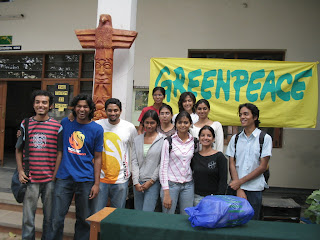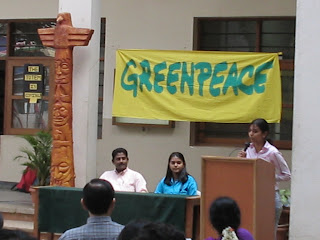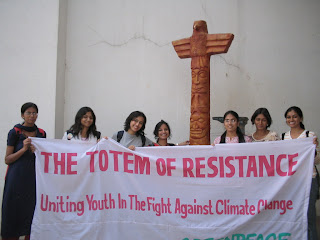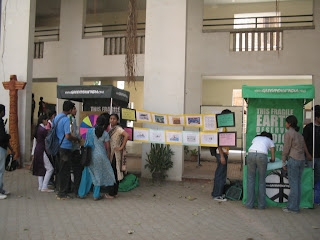This time with a bigger bang. A 3 day event was organised from the 19th to the 21st of February as part of the Totem's tour. The Totem of Resistance which stands for untiting the youth in the fight against Climate Change, made a stop at St. Joseph's College before it continued its journey around the country and the rest of the world.A formal inauguration of the Totem marked the beginning of the 3 day event, with Maitree Dasgupta (Solargeneration Co-ordinator) and Mr. Ebeneezer Wilson (H.O.D., Department of Environmental Science) as the Chief Guests. Our members spoke to an audience of students and teachers about Solargen and its activities. An appeal was made to the students to join us in this movement. The inauguration concluded with a few words from Mr. Wilson.Games, organised to spread the message 'Climate Change is real. Its here and each one of us is involved', attracted both students and teachers. Speaking to each of them during the games helped us realise that their take on Climate Change was "just something happening to somebody else and someone will eventually take care of it", despite the fact that Climat Change is real and the effects have already begun to appear. Their interest in learning about Climate Change and what role they could play to stop it was a battle half won.The second and third days concluded with the screening of documentaries. On the second day, 'An Inconvenient Truth" by Al Gore was screened, while on the third day, 'Changes in Climate, Changes in Lives', a Greenpeace Brazil documentary was shown. These documentaries evoked the feeling of urgency to take action.
AND TAKE ACTION WE WILL!!!
Tuesday, February 27, 2007
Thursday, February 22, 2007
Tuesday, February 06, 2007
Screening Ganges documentary at Mount Carmel College,Bangalore
On Saturday February 3rd, Solar Generation members were at Mount Carmel College, Bangalore with our ‘Totem of resistance’. We screened our documentary ‘India’s melting glaciers’ on that day as well. ‘India’s melting glaciers’ documents the receding Himalayan glaciers and their impact on the lives of people and the economy of the country. Directed by Michael Nagasaka of Greenpeace International, the film is an insight in to the crucial issue of climate change and its alarming implications. Since Ganga is intrinsically linked to the Indian religious belief and daily life it becomes an appropriate example of how climate change can affect existence.
Some renowned glaciologists and other scientific data point out that the Gangotri glacier that feeds Ganga is melting at an alarming rate of 34 metres per year. When glaciers recede they immediately release more water. However later, due to a decrease in the total volume of glacial ice, the volume of water discharged decreases. This affects drinking water supply, irrigation and hydropower, directly or indirectly impacting the lives and livelihoods of millions of people. The Ganga which receives 70% of its summer water flow from the Himalayan glaciers sustains over 500 million people. The Stern report estimates that loss of water flow could lead to a drop in regional crop production by more than 20%, which in turn could lead to a loss in GDP as high as 9-13% by 2100.
However, climate change is primarily human induced. The key reason behind climate change is the growth of green house emissions. The Greenhouse gasses emitted by non-renewable sources like coal power plants that provide nearly 70% of India’s electricity are a major contributor to the crisis. Switching to renewable energy is a viable and far-reaching alternative to greenhouse emissions along with energy efficiency methods.
.
Our documentary received good response particularly from teachers of Mount Carmel College Environmental Science department. They want to screen this documentary in their classes to make the issue of climate change more live to the students.
There was also screening of another well-known documentary by Al Gore ‘The inconvenient truth’.
Some renowned glaciologists and other scientific data point out that the Gangotri glacier that feeds Ganga is melting at an alarming rate of 34 metres per year. When glaciers recede they immediately release more water. However later, due to a decrease in the total volume of glacial ice, the volume of water discharged decreases. This affects drinking water supply, irrigation and hydropower, directly or indirectly impacting the lives and livelihoods of millions of people. The Ganga which receives 70% of its summer water flow from the Himalayan glaciers sustains over 500 million people. The Stern report estimates that loss of water flow could lead to a drop in regional crop production by more than 20%, which in turn could lead to a loss in GDP as high as 9-13% by 2100.
However, climate change is primarily human induced. The key reason behind climate change is the growth of green house emissions. The Greenhouse gasses emitted by non-renewable sources like coal power plants that provide nearly 70% of India’s electricity are a major contributor to the crisis. Switching to renewable energy is a viable and far-reaching alternative to greenhouse emissions along with energy efficiency methods.
.
Our documentary received good response particularly from teachers of Mount Carmel College Environmental Science department. They want to screen this documentary in their classes to make the issue of climate change more live to the students.
There was also screening of another well-known documentary by Al Gore ‘The inconvenient truth’.
Subscribe to:
Posts (Atom)




